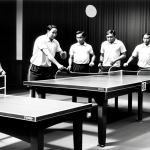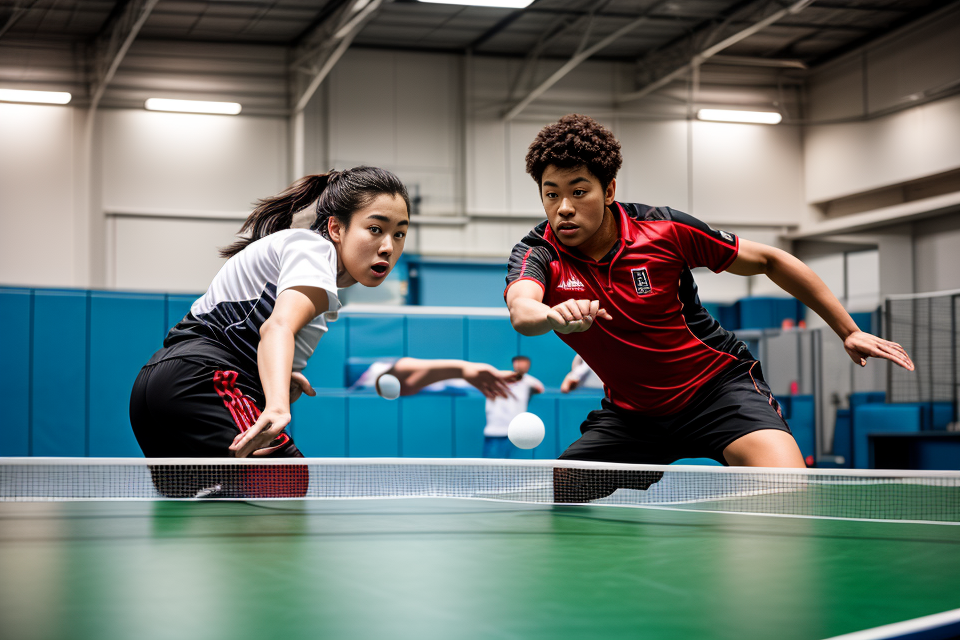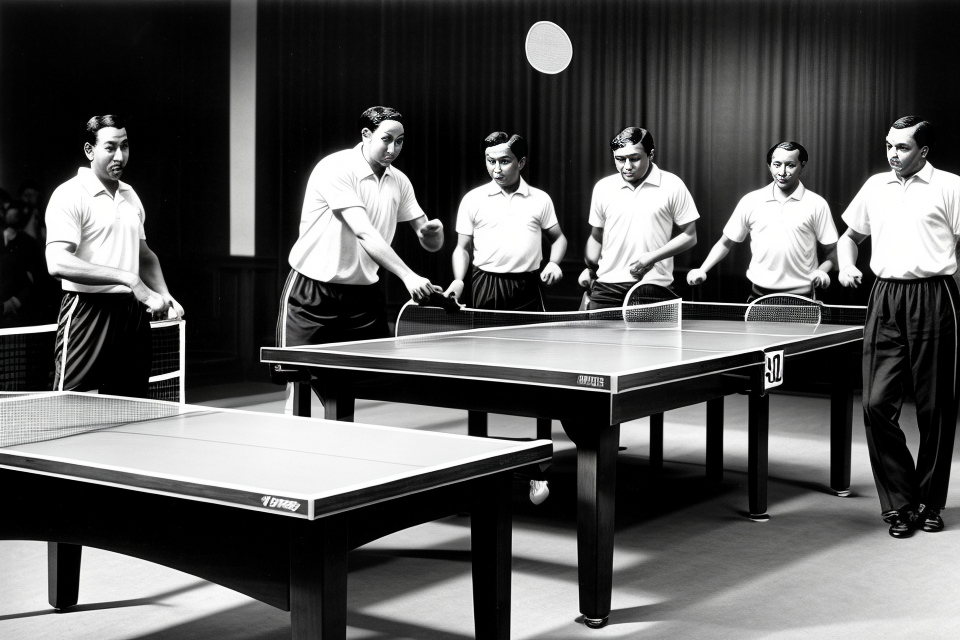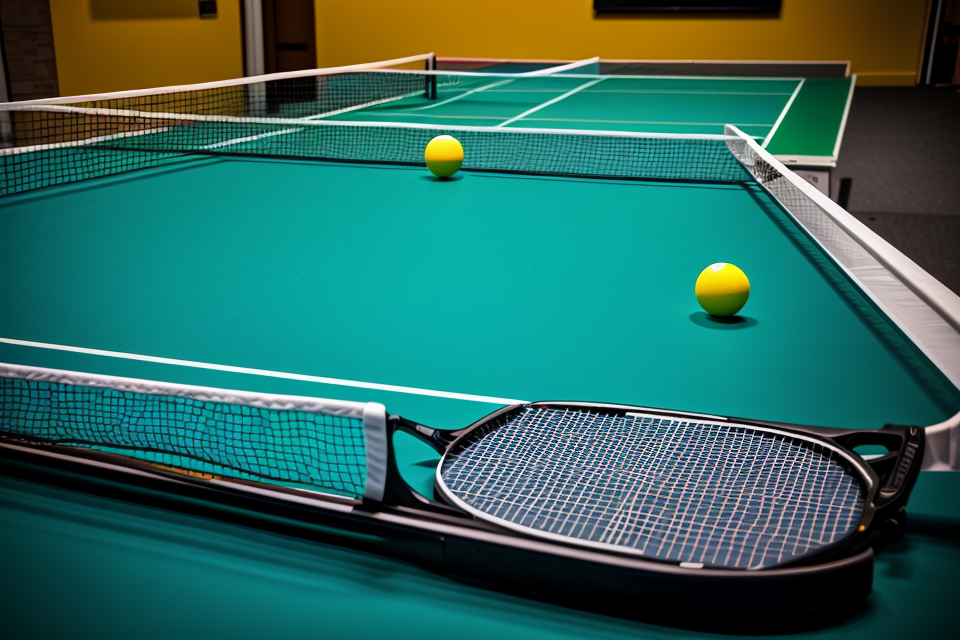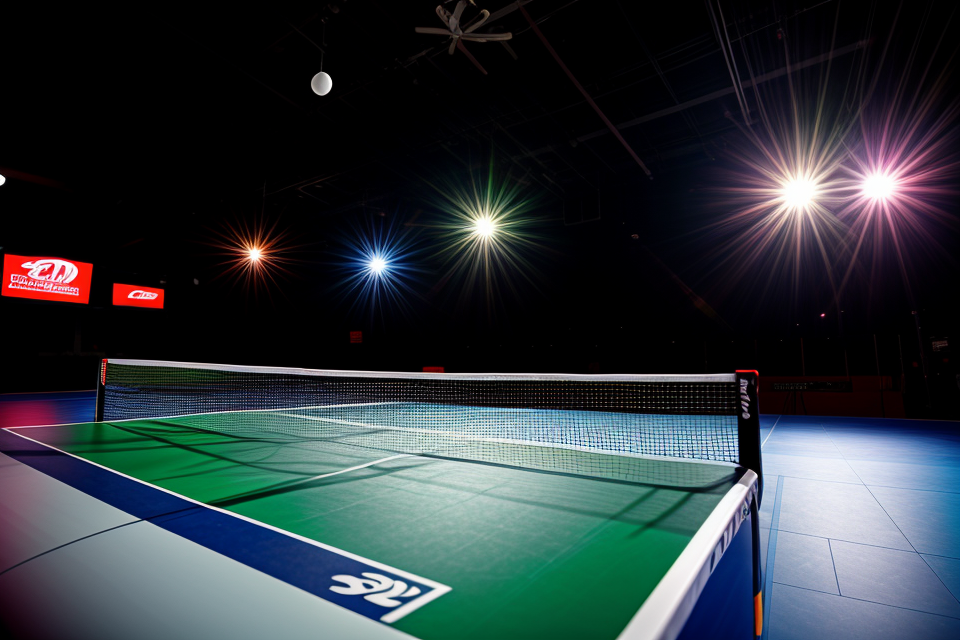Table tennis is often dismissed as just a fun, casual game played in backyards and recreation centers. But what if we told you that playing table tennis can actually have significant cognitive benefits? Research has shown that table tennis can improve brain function, including hand-eye coordination, reaction time, and decision-making skills. In this article, we’ll explore the cognitive benefits of table tennis and how playing this seemingly simple game can enhance your brain function. So, grab a paddle and get ready to discover the surprising ways in which table tennis can boost your brain power!
The Mental Advantages of Table Tennis
Improving Reaction Time and Hand-Eye Coordination
Table tennis is a sport that requires quick reflexes, excellent hand-eye coordination, and lightning-fast reaction times. These cognitive skills are crucial for success on the table tennis court, and they also have numerous benefits for overall brain function.
How table tennis enhances hand-eye coordination
Hand-eye coordination is the ability to track moving objects with your eyes and coordinate your hands to make accurate movements in response. Playing table tennis regularly can significantly improve hand-eye coordination, as it requires players to hit a small, fast-moving ball with great precision. This requires the brain to integrate visual information with motor control, leading to improved coordination and reaction times.
Enhancing reaction time through table tennis drills
Reaction time is the amount of time it takes for the brain to receive a stimulus and respond to it. In table tennis, reaction time is critical for returning an opponent’s shot or anticipating their next move. To improve reaction time, players can engage in specific table tennis drills, such as ball bouncing or catching. These drills involve rapid movement and focus, which can help to enhance reaction time and improve overall cognitive function.
Moreover, table tennis involves a high degree of decision-making, as players must quickly assess their opponent’s positioning, style, and intended shot, and then respond accordingly. This decision-making process requires rapid cognitive processing and enhances the ability to think on one’s feet, both of which can have broader cognitive benefits outside of the sport.
In summary, playing table tennis can significantly improve hand-eye coordination and reaction time, two critical cognitive skills for success on the court. Additionally, the fast-paced nature of the sport and the need for rapid decision-making can have broader benefits for cognitive function and brain health.
Boosting Problem-Solving Skills
- Enhancing strategic thinking through table tennis
- Assessing the game situation
- Analyzing the strengths and weaknesses of opponents
- Identifying patterns and predicting moves
- Adapting to changing circumstances
- Modifying tactics based on the opponent’s playstyle
- Responding to unexpected events and adjusting strategy accordingly
- Assessing the game situation
- Encouraging critical thinking in table tennis
- Evaluating different strategies and selecting the most effective one
- Making quick decisions under pressure
- Learning from mistakes and adapting strategies for future matches
Table tennis requires players to engage in continuous decision-making, as they must strategize and react to their opponent’s moves. This process enhances problem-solving skills by promoting critical thinking and adaptability. The game demands a high level of mental focus and attention, as players must constantly assess the game situation and adjust their strategies accordingly. As a result, playing table tennis can improve cognitive abilities and enhance overall brain function.
Developing Spatial Awareness
Spatial awareness refers to the ability to perceive and understand the relative positions of objects in space. This skill is essential in table tennis, as players must quickly and accurately judge the position of the ball and their opponent to make effective shots.
Table tennis is a fast-paced game that requires constant movement and quick decision-making. Players must be able to visually track the ball’s trajectory and predict its path, while also keeping track of their opponent’s position and movements. As a result, playing table tennis can help improve spatial awareness and enhance cognitive function.
One study found that playing table tennis regularly can lead to significant improvements in spatial awareness and visual-motor coordination. Researchers found that after six months of regular table tennis training, participants showed significant improvements in their ability to track moving objects and make accurate predictions about the ball’s path.
In addition to improving spatial awareness, playing table tennis can also enhance other cognitive skills, such as reaction time, decision-making, and attention. These skills are essential for success in many areas of life, from sports and games to work and daily tasks.
Overall, playing table tennis can be a fun and effective way to improve cognitive function and enhance mental abilities. Whether you are a beginner or an experienced player, incorporating table tennis into your routine can have a positive impact on your brain health and overall well-being.
Enhancing Memory Function
Table tennis is a sport that requires players to remember various strategies, tactics, and techniques to play effectively. This constant mental activity can have a positive impact on memory function. In this section, we will explore the role of memory in table tennis and how playing table tennis can improve memory function.
The Role of Memory in Table Tennis
In table tennis, memory plays a crucial role in the success of a player. Players must remember the position of the ball, the opponent’s playing style, and their own strategies to make critical decisions during the game. They must also remember the sequence of shots played in the rally to anticipate their opponent’s next move.
Furthermore, memory is essential for muscle memory, which is the ability of the body to remember and repeat movements without conscious thought. Muscle memory allows players to execute shots accurately and consistently, even under pressure.
How Playing Table Tennis Can Improve Memory Function
Playing table tennis can improve memory function in several ways. Firstly, the mental activity involved in playing table tennis requires players to focus and concentrate, which can enhance their working memory. Working memory is the system responsible for temporarily storing and manipulating information.
Secondly, playing table tennis can improve long-term memory by creating new neural connections in the brain. When players learn new skills or strategies, they create new neural pathways in the brain, which can lead to improved memory function.
Lastly, playing table tennis can also improve spatial memory, which is the ability to remember the position of objects in space. This is particularly important in table tennis, as players must remember the position of the ball and their opponent on the table.
In conclusion, playing table tennis can have a positive impact on memory function. The mental activity involved in the sport can enhance working memory, create new neural connections in the brain, and improve spatial memory. By incorporating table tennis into their routine, individuals can potentially improve their memory function and enjoy the cognitive benefits of this exciting sport.
Building Focus and Concentration
The Importance of Focus and Concentration in Table Tennis
Table tennis is a sport that requires split-second decisions, quick reactions, and intense concentration. Focus and concentration are crucial to success in the game, as players must constantly adjust their strategies and maintain a high level of mental alertness. The ability to concentrate for extended periods, block out distractions, and maintain a clear mind is essential for achieving success in table tennis.
How Playing Table Tennis Can Improve Focus and Concentration
Research has shown that playing table tennis can improve focus and concentration in several ways. Firstly, the fast-paced nature of the game requires players to maintain a high level of mental alertness, which can help to improve overall concentration levels. Secondly, the strategic aspect of the game requires players to make split-second decisions, which can help to improve the ability to focus and concentrate.
Additionally, table tennis can help to improve working memory, which is the ability to hold and manipulate information in the mind. This is because the game requires players to constantly adapt their strategies based on their opponent’s moves, which can help to improve the ability to remember and process information quickly.
Moreover, playing table tennis can also help to reduce stress and anxiety, which can improve overall cognitive function and increase the ability to concentrate. The physical activity involved in playing table tennis can also help to improve blood flow to the brain, which can lead to improved cognitive function and concentration.
In conclusion, playing table tennis can provide significant cognitive benefits, including improved focus and concentration. The fast-paced nature of the game, the strategic decision-making required, and the physical activity involved can all contribute to improved cognitive function and concentration levels.
Cultivating Multitasking Skills
The demands of multitasking in table tennis
In table tennis, players must constantly switch between various tasks, such as focusing on the ball, anticipating their opponent’s moves, and executing their own shots. This requires the player to maintain concentration, track multiple moving objects, and make split-second decisions.
How playing table tennis can improve multitasking skills
Studies have shown that playing table tennis can lead to improved multitasking skills due to the constant switching of attention and focus required in the game. The fast-paced nature of table tennis means that players must be able to process information quickly and efficiently, allowing them to make better decisions on the court.
Additionally, playing table tennis can improve cognitive flexibility, which is the ability to adapt to changing situations and requirements. The dynamic nature of the game means that players must be able to adjust their strategies and tactics on the fly, requiring them to use their cognitive flexibility to its full potential.
Overall, playing table tennis can help improve multitasking skills and cognitive flexibility, which can have a positive impact on other areas of life, such as work and personal relationships.
The Physical Benefits of Table Tennis
Improving Cardiovascular Health
Table tennis is a sport that is often overlooked when it comes to its physical benefits. However, playing table tennis can have a significant impact on cardiovascular health.
- The cardiovascular benefits of playing table tennis
Table tennis is a sport that requires quick movements and can help improve cardiovascular health. The constant movement and change of direction can help increase heart rate and improve cardiovascular endurance. The sport also requires quick reflexes and hand-eye coordination, which can help improve overall physical fitness.
- How table tennis can be a part of a cardiovascular workout
Table tennis can be incorporated into a cardiovascular workout routine. The sport can provide a fun and challenging way to improve cardiovascular health. It can also be played both individually and as a team, making it a great way to socialize and stay active.
Additionally, table tennis can be played at a variety of skill levels, making it accessible to people of all ages and fitness levels. Whether you are a beginner or an experienced player, table tennis can provide a challenging and enjoyable workout that can help improve cardiovascular health.
In conclusion, playing table tennis can have a significant impact on cardiovascular health. The sport can help improve heart rate, cardiovascular endurance, and overall physical fitness. Incorporating table tennis into a cardiovascular workout routine can provide a fun and challenging way to stay active and improve health.
Building Strength and Endurance
Playing table tennis is a physically demanding sport that requires quick movements, agility, and hand-eye coordination. As such, it can provide a range of physical benefits, including building strength and endurance.
The Physical Demands of Table Tennis
Table tennis is a fast-paced sport that involves running, jumping, and quick changes of direction. Players need to be able to move quickly and accurately to hit the ball and return it to their opponent. In addition, players need to have strong muscles in their arms, legs, and core to generate the power needed to hit the ball with force.
How Playing Table Tennis Can Improve Strength and Endurance
Regular table tennis practice can help players build strength and endurance in several ways. First, the sport requires players to move their bodies in a variety of directions, which can help improve overall physical fitness. Second, the rapid movements and changes of direction required in table tennis can help improve cardiovascular health and endurance. Finally, the physical exertion required to hit the ball with force can help build muscle strength and improve overall physical fitness.
Furthermore, research has shown that playing table tennis can provide similar physical benefits to other sports, such as running or cycling. This means that playing table tennis can be a great way to stay active and improve physical fitness, even for those who may not enjoy more traditional sports.
In conclusion, playing table tennis can provide a range of physical benefits, including building strength and endurance. Whether you are a beginner or an experienced player, incorporating table tennis into your regular exercise routine can be a fun and effective way to improve your physical fitness.
Reducing Stress and Anxiety
Table tennis is often touted as a fun and casual sport, but it offers a wealth of physical benefits that make it an excellent form of exercise. One of the most significant advantages of playing table tennis is its ability to reduce stress and anxiety.
The calming effects of table tennis
Playing table tennis has been shown to have a calming effect on the mind and body. The rhythmic movements involved in playing the game, combined with the focus required to hit the ball, can help to reduce feelings of stress and anxiety. In addition, the social aspect of playing table tennis with others can also provide a sense of camaraderie and support, further contributing to a feeling of relaxation.
How playing table tennis can reduce stress and anxiety
Research has shown that playing table tennis can lead to a reduction in stress and anxiety levels. One study found that playing table tennis for just 10 minutes was enough to reduce cortisol levels, a hormone associated with stress, by 22%. Additionally, another study found that playing table tennis improved mood and reduced anxiety in patients with chronic stress-related disorders.
The physical benefits of table tennis are numerous, and one of the most significant advantages is its ability to reduce stress and anxiety. Whether you’re looking to improve your mental health or simply want to have fun, playing table tennis is an excellent way to achieve both goals.
Enhancing Balance and Coordination
- The Importance of Balance and Coordination in Table Tennis
In table tennis, balance and coordination are crucial skills for players to possess. These skills allow players to move quickly and efficiently around the table, and to hit the ball with precision and accuracy. Without good balance and coordination, it is difficult to execute complex shots and maintain control over the game.
- How Playing Table Tennis Can Improve Balance and Coordination
Playing table tennis regularly can help improve balance and coordination in several ways. Firstly, the fast-paced nature of the game requires players to make quick movements and changes of direction, which can help improve their overall balance and stability. Secondly, the spinning and rotating movements involved in hitting the ball can help improve hand-eye coordination and body awareness. Finally, the mental focus and concentration required to play table tennis can help improve cognitive function and reaction time, which can also contribute to better balance and coordination.
Overall, playing table tennis can be an effective way to improve balance and coordination, which can have numerous physical and cognitive benefits. By incorporating table tennis into their exercise routine, individuals can improve their overall physical fitness and cognitive function, and potentially reduce their risk of developing age-related conditions such as dementia and Alzheimer’s disease.
Supporting Weight Loss
The calorie-burning potential of table tennis
Table tennis is a physically demanding sport that requires quick movements, agility, and hand-eye coordination. As such, it can be an effective form of exercise for burning calories and improving overall physical fitness. According to studies, a 150-pound person can burn up to 270 calories in just 30 minutes of playing table tennis. This makes it an excellent form of exercise for those looking to lose weight or maintain a healthy weight.
How playing table tennis can contribute to weight loss efforts
In addition to its calorie-burning potential, table tennis can also help individuals maintain a healthy weight by promoting a healthy lifestyle. Playing table tennis regularly can help individuals develop healthy habits such as regular exercise and social interaction, which are both important for maintaining a healthy weight. Moreover, table tennis is a fun and engaging sport that can help individuals stay motivated and committed to their weight loss goals.
Moreover, table tennis is a low-impact sport that is easy on the joints, making it an excellent form of exercise for individuals with joint or mobility issues. It is also a great way to improve hand-eye coordination, reflexes, and reaction time, which can all contribute to overall physical fitness.
Overall, playing table tennis can be an effective way to support weight loss efforts and promote a healthy lifestyle. Its physical benefits, combined with its cognitive benefits, make it a great activity for individuals looking to improve their physical and mental well-being.
FAQs
1. What are the cognitive benefits of playing table tennis?
Table tennis is a sport that requires both physical and mental abilities. It can improve hand-eye coordination, reaction time, and spatial awareness. It also requires strategic thinking, decision-making, and memory recall, which can improve cognitive function.
2. Is table tennis good for people of all ages?
Yes, table tennis is a sport that can be enjoyed by people of all ages. It is a low-impact activity that can be modified to suit different skill levels and abilities. Playing table tennis can help maintain and improve cognitive function in both young and old players.
3. How often should I play table tennis to see cognitive benefits?
Regular play is key to seeing cognitive benefits from table tennis. Ideally, aim for at least 30 minutes of play, three to four times a week. The more you play, the more likely you are to see improvements in cognitive function.
4. Is table tennis a better workout for the brain than other sports?
Table tennis can be a great workout for the brain, but it’s difficult to compare it to other sports in terms of cognitive benefits. All sports have their own unique benefits, and the best sport for the brain will depend on the individual’s interests and abilities.
5. Can table tennis help prevent cognitive decline?
Regular play can help maintain cognitive function and may even help prevent cognitive decline in older adults. It’s important to stay mentally and physically active as we age to maintain brain health.
6. Can playing table tennis improve memory?
Yes, playing table tennis can improve memory by requiring players to recall and use strategies, patterns, and movements. It can also improve working memory, which is the ability to hold and manipulate information in short-term memory.
7. Can table tennis improve problem-solving skills?
Yes, table tennis requires strategic thinking and decision-making, which can improve problem-solving skills. Players must analyze their opponent’s moves and plan their own strategy, which can help improve cognitive function.
8. Is table tennis better for improving cognitive function than playing video games?
Both table tennis and video games can improve cognitive function, but they do so in different ways. Table tennis requires physical activity and social interaction, which can also improve cognitive function. Video games, on the other hand, may improve hand-eye coordination and reaction time but may not provide the same level of physical and social benefits.
